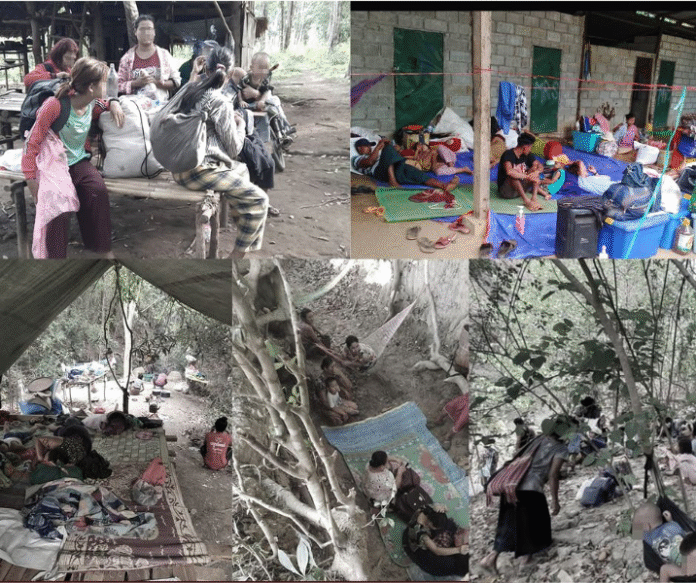An interview with Nai Aue Mon, Director of the Human Rights Foundation of Monland (HURFOM), on the living conditions, health challenges during the rainy season, and human rights violations faced by internally displaced persons (IDPs) from Launglon, Dawei, Yebyu, and Tha Yet Chaung Townships.
As fighting between the military council and local defense forces in Tanintharyi Region intensifies, the number of displaced people fleeing their homes is also increasing.
In particular, artillery shelling, aerial bombings, and area clearance operations carried out by the junta in Launglon, Dawei, Yebyu and Tha Yet Chaung Townships have forced local civilians to abandon their homes and flee to safer areas.
During the rainy season, the living conditions, food security, health, and human rights violations faced by displaced people have worsened significantly. Network Media Group (NMG) interviewed Nai Aue Mon, Director of the Human Rights Foundation of Monland (HURFOM), to discuss these challenges.
Q: Could you first tell us about the current situation of the displaced people in Launglong Township?
A: Currently, there are over 3,000 displaced people in Launglon Township alone. The primary cause is the junta’s indiscriminate artillery shelling, coupled with attacks launched from naval bases along the waterways. These actions constitute war crimes directly targeting civilians. At present, civilians from approximately four or five villages in the Launglon area, as well as residents of Launglon town itself, have been forced to flee their homes. Now is the rainy season. There is an urgent need for shelter, food, and adequate nutrition for young children, as people continue to endure extremely difficult conditions.
Q: Now that the rainy season has arrived, what are the health concerns for the displaced?
A: Health is a major concern. In addition to the regular seasonal flu, dengue fever and diarrhea are common among children. These illnesses tend to spread rapidly in groups, making the situation even more dangerous. Another major issue is malnutrition. In addition, both the elderly and children are experiencing psychological trauma and symptoms of severe anxiety. With only a few organizations offering healthcare, obtaining treatment is very difficult.
Q: Besides Launglon, which areas in Tanintharyi Region are still experiencing ongoing fighting? What could be the junta’s intentions?
A: Fighting has spread across nearly the entire Tanintharyi Region. Besides Launglon, clashes continue in the eastern part of Dawei, the northeastern area of Yebyu, southern Tha Yet Chaung, as well as Palaw and Pala in Myeik District, and Bokepyin Township. In the southern part of Ye Township, bordering Mon State, both resistance forces and junta troops are present, creating a tense situation.
The junta likely has two main intentions. First, to secure territorial control to pave the way for investment projects agreed upon with Russia. Second, to intensify fighting as they increase pressure to demonstrate their control and governance in preparation for the upcoming election they plan to hold.
Q: Is it possible for the junta to hold elections in areas where fighting is intensifying?
A: In reality, holding elections is impossible. Just like in Karen State, clashes are widespread throughout Tanintharyi. Even if the junta tries to hold elections, they would only be able to stage them in secure urban areas, making a nationwide election completely unfeasible. If the junta forces the election, they would need to rely heavily on overwhelming military power and conduct it in multiple phases, meaning it would not be a free and fair election.
Q: Besides the ongoing fighting, what types of human rights violations is the junta committing?
A: The violations are taking place in many forms. Civilians are being used as human shields, forced to clear landmines ahead of military columns, and subjected to arbitrary arrests—these are all serious violations. Additionally, under the pretext of the conscription law, young people are being unlawfully detained, extorted for money if they refuse to attend military training, and in some cases, effectively kidnapped. There have also been reports of missing children.
Q: How would you assess the situation this year? Is there anything else you would like to add?
A: To put it simply, compared to the past 3 to 4 years, 2025 could become the most difficult year for displaced people. The fighting is intensifying, and human rights violations are increasing alarmingly. It is estimated that the number of displaced people could exceed 100,000. However, as international aid funds have dwindled, the humanitarian aid sector has weakened. With needs continuing to grow and aid becoming increasingly scarce, the situation is expected to worsen further. On the ground, all signs point to an even more challenging year ahead.
Sent by NMG

